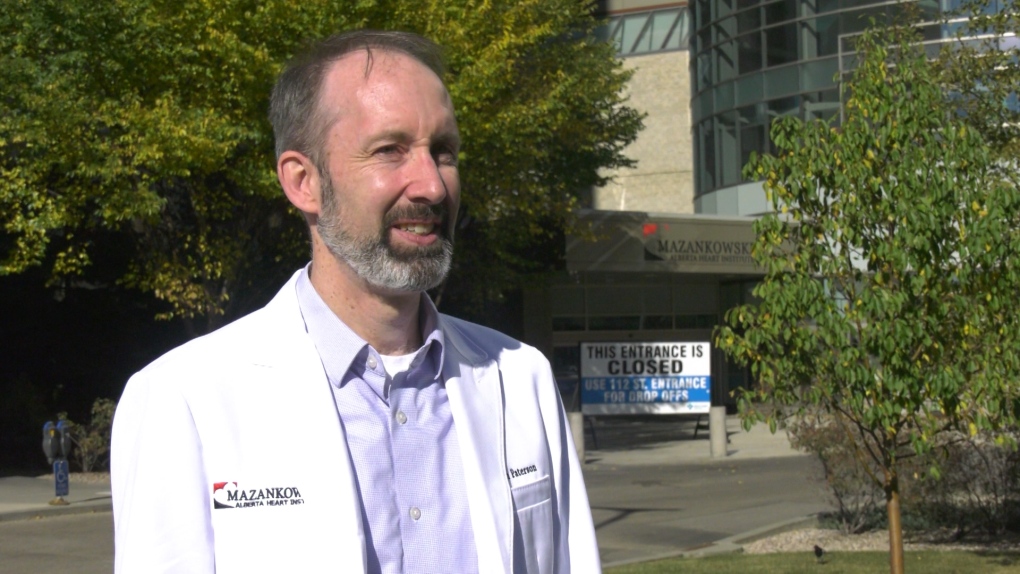Oilers' Archibald's risk of myocarditis would have been '10,000-fold' lower from COVID-19 vaccine: cardiologist
As revelations emerge about the Edmonton Oilers' only player still unvaccinated against COVID-19 developing myocarditis, an Edmonton cardiologist wants you to know your risk of dealing with the same heart condition.
On Sunday, Oilers head coach Dave Tippett told reporters that it's believed forward Josh Archibald, 28, developed myocarditis because of an asymptomatic case of COVID-19 that initially went undetected over the summer.
Archibald joins his teammate Alex Stalock on the injured reserve, who is also sidelined indefinitely with myocarditis after a case of COVID-19.
Myocarditis is a term that refers to inflammation of the heart muscle.
According to Dr. Ian Paterson, a cardiologist with the Mazankowski Alberta Heart Institute, the most common cause of the condition is a virus like COVID-19.
"Myocarditis related to COVID, related to the virus itself, is said to effect approximately five to 15 per cent of people who have been sick with the virus," Dr. Paterson told CTV News Edmonton on Monday.
The Edmonton cardiologist said, while cases of myocarditis have been linked to COVID-19 vaccines, those instances are much more rare than ones linked to COVID-19 itself.
"It's about a one in 100,000 risk of developing myocarditis from the vaccine versus about 10 per cent from the virus."
That's a roughly 0.001 per cent chance of developing the condition because of the COVID-19 vaccine.
 "That's a 10,000 fold greater risk of getting myocarditis from the virus, we think, than from the vaccine," said Dr. Paterson. "So absolutely we think that the vaccine will protect people from the virus and getting myocarditis from the virus."
"That's a 10,000 fold greater risk of getting myocarditis from the virus, we think, than from the vaccine," said Dr. Paterson. "So absolutely we think that the vaccine will protect people from the virus and getting myocarditis from the virus."
Dr. Paterson said while being vaccinated against COVID-19 greatly reduces the risk of getting the disease, experts don't yet know if myocarditis is less likely to occur from breakthrough infections of COVID-19.
Last week, the Ontario government recommended people between the ages of 18 and 24 receive the Pfizer COVID-19 vaccine instead of Moderna because of an observed increase of cases of myocarditis.
They said the move was "out of an abundance of caution."
While the prognosis for people with COVID-19-related myocarditis is generally good, Dr. Paterson said it's recommended that physical sports be suspended for three to six months for people with the heart condition.
"Myocarditis related to virus, including COVID, we think are self-limited, meaning that people do expect a complete recovery of their heart," he said. "There is, however, concerns about athletes returning to play after they've had myocarditis."
"It's an injury to the heart," he said. "It's causing some inflammation of the heart muscle and there's a risk that if you're stimulating the body and, you know, exercising and having a lot of adrenaline pumping through you, that it could irritate the heart."
On Sunday, Tippett said Archibald is still receiving multiple medical tests and there's no timeline for his return.
With files from CTV News Edmonton's Ryan Harding
CTVNews.ca Top Stories

BREAKING Prime Minister Trudeau to meet Donald Trump at Mar-a-Lago
Prime Minister Justin Trudeau has landed in West Palm Beach, Fla., on Friday evening to meet with U.S.-president elect Donald Trump, sources confirm to CTV News.
'Mayday! Mayday! Mayday!': Details emerge in Boeing 737 incident at Montreal airport
New details suggest that there were communication issues between the pilots of a charter flight and the control tower at Montreal's Mirabel airport when a Boeing 737 made an emergency landing on Wednesday.
Hit man offered $100,000 to kill Montreal crime reporter covering his trial
Political leaders and press freedom groups on Friday were left shell-shocked after Montreal news outlet La Presse revealed that a hit man had offered $100,000 to have one of its crime reporters assassinated.
Cucumbers sold in Ontario, other provinces recalled over possible salmonella contamination
A U.S. company is recalling cucumbers sold in Ontario and other Canadian provinces due to possible salmonella contamination.
John Herdman resigns as head coach of Toronto FC
John Herdman, embroiled in the drone-spying scandal that has dogged Canada Soccer, has resigned as coach of Toronto FC.
Musk joins Trump and family for Thanksgiving at Mar-a-Lago
Elon Musk had a seat at the family table for Thanksgiving dinner at Mar-a-Lago, joining President-elect Donald Trump, Melania Trump and their 18-year-old son.
Billboard apologizes to Taylor Swift for video snafu
Billboard put together a video of some of Swift’s achievements and used a clip from Kanye West’s music video for the song “Famous.”
Trudeau says no question Trump is serious on tariff threat
Prime Minister Justin Trudeau says incoming U.S. president Donald Trump's threats on tariffs should be taken seriously.
In a shock offensive, insurgents breach Syria's largest city for the first time since 2016
Insurgents breached Syria's largest city Friday and clashed with government forces for the first time since 2016, according to a war monitor and fighters, in a surprise attack that sent residents fleeing and added fresh uncertainty to a region reeling from multiple wars.


































